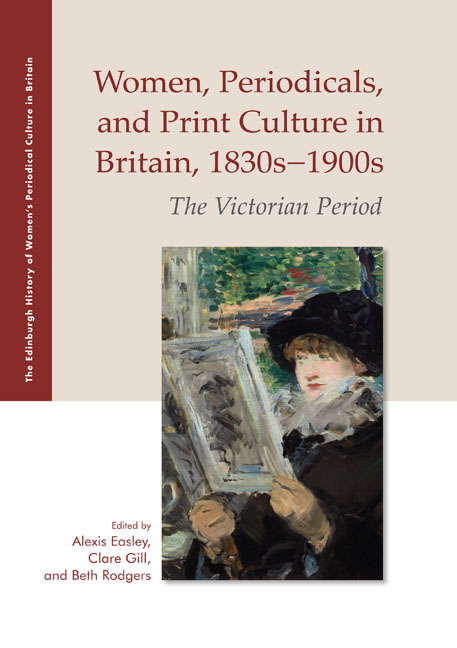Book contents
- Frontmatter
- Contents
- List of Illustrations
- Acknowledgments
- Introduction: Women, Periodicals, and Print Culture in the Victorian Period
- Part I (Re)Imagining Domestic Life
- Part II Constructing Modern Girls and Young Women
- Constructing Modern Girls and Young Women: Introduction
- 7 Promoting a Do-It-Yourself Spirit: Samuel Beeton's Young Englishwoman
- 8 Claiming Medicine as a Profession for Women: The English Woman's Journal's Campaign for Female Doctors
- 9 Encouraging Charitable Work and Membership in the Girls’ Friendly Society through British Girls’ Periodicals
- 10 ‘Welcome and Appeal for the “Maid of Dundee”’: Constructing the Female Working-Class Bard in Ellen Johnston's Correspondence Poetry, 1862–1867
- 11 The Editor of the Period: Alice Corkran, the Girl's Realm, and the Woman Editor
- 12 The ‘Most-Talked-Of Creature in the World’: The ‘American Girl’ in Victorian Print Culture
- Part III Women and Visual Culture
- Part IV Making Space for Women
- Part V Constructing Women Readers and Writers
- Part VI Intervening in Political Debates
- Notes on Contributors
- Index
- Plate section
11 - The Editor of the Period: Alice Corkran, the Girl's Realm, and the Woman Editor
from Part II - Constructing Modern Girls and Young Women
Published online by Cambridge University Press: 25 October 2019
- Frontmatter
- Contents
- List of Illustrations
- Acknowledgments
- Introduction: Women, Periodicals, and Print Culture in the Victorian Period
- Part I (Re)Imagining Domestic Life
- Part II Constructing Modern Girls and Young Women
- Constructing Modern Girls and Young Women: Introduction
- 7 Promoting a Do-It-Yourself Spirit: Samuel Beeton's Young Englishwoman
- 8 Claiming Medicine as a Profession for Women: The English Woman's Journal's Campaign for Female Doctors
- 9 Encouraging Charitable Work and Membership in the Girls’ Friendly Society through British Girls’ Periodicals
- 10 ‘Welcome and Appeal for the “Maid of Dundee”’: Constructing the Female Working-Class Bard in Ellen Johnston's Correspondence Poetry, 1862–1867
- 11 The Editor of the Period: Alice Corkran, the Girl's Realm, and the Woman Editor
- 12 The ‘Most-Talked-Of Creature in the World’: The ‘American Girl’ in Victorian Print Culture
- Part III Women and Visual Culture
- Part IV Making Space for Women
- Part V Constructing Women Readers and Writers
- Part VI Intervening in Political Debates
- Notes on Contributors
- Index
- Plate section
Summary
FOLLOWING ON FROM the success of magazines like the Girl's Own Paper (1880– 1956), Atalanta (1887–98), and the Young Woman (1892–8), the Girl's Realm was launched in November 1898. Priced at sixpence, this middle-class monthly magazine was one of the most expensive and expensively produced girls’ magazines. It printed photography, carried interviews with leading writers and celebrity figures, and gave away bicycles and pianos in prize competitions. Scholars of girls’ periodicals such as Sally Mitchell (1995) and Kristine Moruzi (2012) have noted that Girl's Realm also stood out from its competitors due to its self-consciously modern outlook, with its apparent endorsement of employment, education, and modern pastimes such as photography and cycling. Editor Alice Corkran (c. 1847–1916) fostered and encouraged this sense of modernity in a variety of ways, perhaps most deliberately in the naming of her monthly editorial column ‘Chat with the Girl of the Period.’ As Mitchell notes, this was an ‘[assertive reclamation] of the phrase Eliza Lynn Linton had used to castigate girls of the 1860s’ (1995: 110). Linton's infamous ‘Girl of the Period,’ described in her Saturday Review article of 1868 as being vain, immodest, excessive, and flirtatious, is efficiently debunked in Corkran's hands. Corkran was writing thirty years after Linton, but her reclamation of the ‘Girl of the Period’ was timelier than it may at first seem. According to Lyn Pykett, Linton's essays ‘enjoyed a new currency in the 1880s and 1890s (following their publication in volume form in 1883)’ (1992: 158). Corkran, who was herself part of the generation under fire in Linton's original piece, perhaps recognised something similar in more recent debates about modern girlhood and the New Woman.
Alice Corkran was by no means the most famous or longest-serving woman editor of the nineteenth century, but she stands as a revealing case study. Historians of the press, including Margaret Beetham, Barbara Onslow, and Beth Palmer, have drawn attention to the particular challenges faced by nineteenth-century women editors such as Eliza Cook, Mary Elizabeth Braddon, Charlotte Yonge, Isabella Beeton, and Annie S. Swan. For example, although the expansion of the press led to an increase in women editors as the century progressed, the ‘cultural association of editorship with manliness’ meant that the very term ‘woman editor’ was seen as contradictory and problematic in some quarters (Palmer 2011: 3, 7).
- Type
- Chapter
- Information
- Women, Periodicals and Print Culture in Britain, 1830s–1900sThe Victorian Period, pp. 164 - 177Publisher: Edinburgh University PressPrint publication year: 2019



